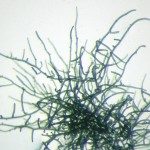Lien vers Pubmed [PMID] – 26236936
Nat. Chem. Biol. 2015 Sep;11(9):705-12
Actin-targeting macrolides comprise a large, structurally diverse group of cytotoxins isolated from remarkably dissimilar micro- and macroorganisms. In spite of their disparate origins and structures, many of these compounds bind actin at the same site and exhibit structural relationships reminiscent of modular, combinatorial drug libraries. Here we investigate biosynthesis and evolution of three compound groups: misakinolides, scytophycin-type compounds and luminaolides. For misakinolides from the sponge Theonella swinhoei WA, our data suggest production by an uncultivated ‘Entotheonella’ symbiont, further supporting the relevance of these bacteria as sources of bioactive polyketides and peptides in sponges. Insights into misakinolide biosynthesis permitted targeted genome mining for other members, providing a cyanobacterial luminaolide producer as the first cultivated source for this dimeric compound family. The data indicate that this polyketide family is bacteria-derived and that the unusual macrolide diversity is the result of combinatorial pathway modularity for some compounds and of convergent evolution for others.


